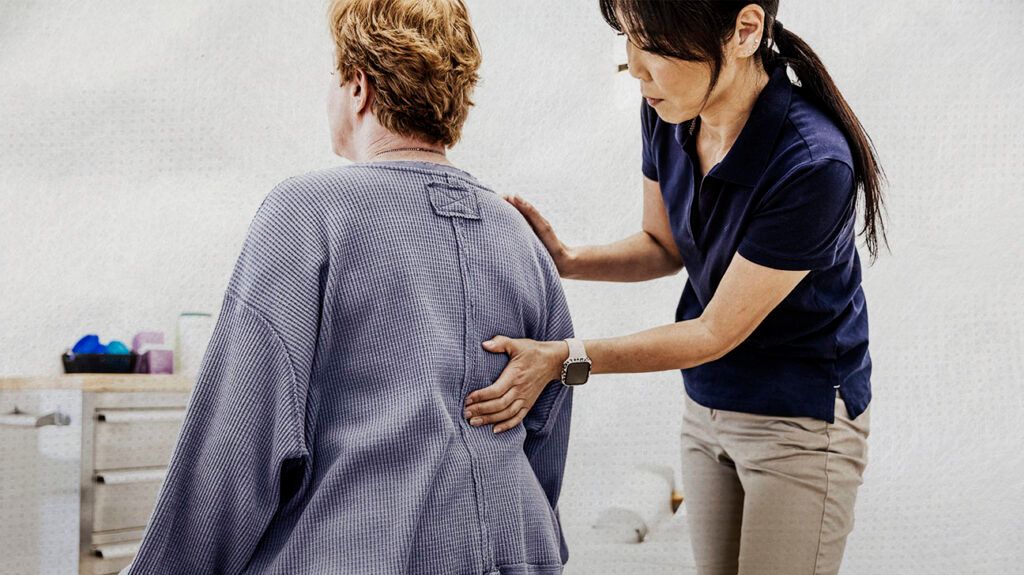Someone should contact a doctor about back pain after a fall if the pain is severe, persists despite rest, or is accompanied by other symptoms, such as vision loss, difficulty breathing, or loss of consciousness.
If a person experiences persistent or worsening pain after a fall, even after trying home remedies to manage symptoms, they should seek medical attention.
It is best to speak with a healthcare professional about any concerns over the severity of a fall or potential injuries.
This article examines the types of injuries that may cause back pain after a fall, symptoms to watch for, when to seek medical help, and more.

Mechanical back pain refers to pain that originates from the spine and surrounding soft tissues. It
Typically, back pain after a fall is mechanical and due to injury, such as:
- sprains and strains, potentially of the muscles, tendons, or ligaments
- ruptured or herniated discs
- fractured vertebrae
- torn soft tissue
- pinched or otherwise injured nerves
Back pain after a fall may be mild, moderate, or severe, depending on the fall itself and the injury.
Muscular pain
When a person experiences muscular back pain after a fall, they likely have some sort of soft tissue injury, such as muscle sprains, strains, or contusions.
Symptoms of muscular injuries may include:
- soreness or aches
- redness or bruising
- inflammation or swelling
- reduced movement
- stiffness after periods of rest
Skeletal pain is typically localized and can feel “sharper” or more intense. It may increase with certain movements. Bone fractures are
Nerve injuries can accompany both muscular and skeletal injuries. Pain from nerve injuries may cause burning or shooting sensations that can radiate beyond the injury site.
More severe symptoms
Pain in the back
- fevers
- night sweats
- unintentional weight loss
- changes in bladder or bowel habits
- frequent falls
- a history of cancer
These symptoms could require additional diagnostic testing to determine the underlying cause of back pain.
The National Institute of Arthritis and Musculoskeletal and Skin Diseases advises people to contact their doctor
Whether or not the person seeks medical care following their fall, they should contact their doctor if their back pain does not ease within
At this point, their doctor may order radiography, a CT scan, or an MRI scan to pinpoint the cause of the problem.
Symptoms that may warrant emergency care include:
- severe pain that does not ease with over-the-counter (OTC) pain relief medication
- numbness or weakness
- instability when standing or walking
- vision loss
- issues with bladder or bowel function
- confusion or other changes in mental status
Additionally, any fall related to a great height or an accident involving a bicycle or motor vehicle calls for an immediate visit to the emergency room.
It is always best to consult a healthcare professional for personalized advice after a fall that causes back pain. However, a person may also consider the following actions if they fall and injure themselves:
- Assess the severity of the fall and prioritize seeking immediate medical attention if there are signs of serious injury.
- Remain calm and try to stay still to prevent further injury.
- Call for emergency assistance if there is severe pain, difficulty remaining consciousness, or difficulty breathing.
- If the fall is less severe, gradually try to move the arms and legs and assess for any pain or limitations in movement.
- Apply ice to the affected area if there is swelling, and
consider taking OTC pain relief medication. - Watch for any signs of concussion, such as dizziness, nausea, or confusion, and seek medical attention if these symptoms arise.
- Rest and avoid strenuous activities to give the body time to recover.
- Consult a healthcare professional for a thorough evaluation, especially if there are persistent or worsening symptoms after the fall.
A person should contact their doctor about back pain after a fall if it is severe, persistent, or accompanied by extreme symptoms.
Seeking medical attention is also advisable if pain persists despite self-care measures or if there are concerns about the severity of the fall.
Healthcare professionals can diagnose the cause of any back pain after a fall and recommend the most appropriate treatment.
